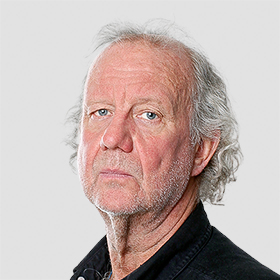Although the windchill had fallen 10 below zero, crowds converged on St Paul's church at the end of Clinton Street in Brooklyn to hear Pete Seeger. That was 1984, more than two decades after Seeger's concert at Carnegie Hall, at which he had delivered to my generation the song We Shall Overcome like an 11th commandment.
Seeger was by now reaching retirement age, but the evening was propelled by impatient vigour and outrage: the concert was a benefit for local community action centres, and Seeger presented an edgy African-American duo called Serious Bizness, who sang about poverty, struggle, racism. Seeger talked about war crimes committed by US-trained death squads in Central America, sang the Cuban rebel song Guantanamera and translated as he went along: "With the poor people of this earth I want to share my fate / The streams of the mountains please me more than the sea…" as he had done at Carnegie Hall in 1963. I had bought a recording of that concert 16 years beforehand, and now Pete Seeger signed my ticket. Even in 1984, Pete Seeger still stood for a time when We Shall Overcome was not just an aspiration, it was a plan. When he closed the concert with that song, it was both dream and statement of intent.
For Seeger's generation "progress" meant something different from the march of concrete, smog, greed and technology it entails today. A time when many people wanted to challenge,rather than conjoin, the order of things; to contest, not wield, the power of their superiors; a time before bedazzlement with capitalism. He was a communist, but no political hack; he brought out the best in the movement; I can still feel his split tenor send a shiver down the spine: "Oh healing river, bring down your waters / And wipe the blood from off the sand".
Seeger's life was a troubadour's tale in itself. His father had been a musicologist and force in the US Communist party. With Aaron Copland, he formed the Composers Collective, and he took Copland to West Virginia to hear gospel songs sung by striking coalminers. As a member of the Young Communist League, Seeger Jnr could not find a job, and performed puppet shows for dairy workers on strike. In 1940, he met two people who would change his life: Alan Lomax and Woody Guthrie.
Lomax, guardian of American folk, wanted Seeger to transcribe a collection of songs for a book, with notes by Guthrie, who would in turn take the younger man to Oklahoma and thence the road. To hear Seeger was to feel that world, to meet him was to touch it.
Seeger served a year of a 10-year jail sentence for refusing to testify before the Un-American Actvities Committee, which had blacklisted his band, the Weavers. But by 1963, his time had come, and it was from Carnegie Hall that We Shall Overcome proceeded, six weeks later, to its status as anthem for Martin Luther King and the marchers on Washington.
Fourteen years after the concert in Brooklyn, I met Pete Seeger after a concert back at Cargnegie Hall to celebrate a half-century of Folkways records. From the stage, Seeger talked about "the days when Woody and I were goin' round singing to the oilfield strikers, that was 1940", and when we talked, he insisted that he was "still a socialist. It's a question of whether we solve the crisis or the crisis solves us."
Seeger was as magnificent in conversation as he was in concert: he recalled an Episcopalian minister, "trying to convince me that quick changes never brought results. I said, 'Well, 2,000 years is a long time to be praying to God to make things better, and after all that time, the bombs still come down and kill innocent women and children – so I'm not too sure about your slow change.'"
However, he reflected, "I think it's going to happen on a local scale now, people acting on what is happening in their neighbourhood, city or town, chipping little cracks in the system that way." He had become patron of a Clearwater project to clean up the Hudson river.
Seeger kept chipping: on the eve of President Obama's inauguration in January 2009, he and Bruce Springsteen sang Woody Guthrie's This Land Is Your Land, adding the verse banned in 1942, and hardly ever sung since: "As I was walkin' – I saw a sign there/ And that sign said no trespassin'/ but on the other side it didn't say nothin'/ Now that side was made for you and me."
Back in 1994, Seeger had been quick to point out the irony of his coming to Washington to receive a National Arts medal from President Bill Clinton: "The whole situation is hilarious," he said. "I've usually come down to Washington to picket the White House and now I'm coming to get a medal! I'll have to be careful not to shoot my mouth off." However, part of capitalism's genius is its ability to commodify its dissidents, and there was something ironic about the fact that on Tuesday's Newsnight, Jeremy Paxman should cue a tribute cover of We Shall Overcome by an old Etonian classmate of Prince William. The establishment against which Pete Seeger levelled his wrath has overcome us entirely, it seems.
When I last met Pete Seeger, in 2008, he seemed to have realised this. It was at the Corn festival in the riverside town of Beacon, New York – home of his Clearwater project – where Seeger was chopping wood, for all his frailty. I think I wanted to ask, as last time, about "bombs still raining down" and where all the flowers had gone. Seeger preferred to talk about devising the right kind of woodwork mesh to create swimming pools in the now cleaner Hudson river. "I don't think people can think big," he said wisely, refusing to be drawn. Unless Seeger had lost interest, which is unlikely, I took him to mean that he knew we'd been overcome, he just didn't want to say so.
And so they die, these poets who propelled the last, failed attempt to overcome – falling fast: Seamus Heaney, now Pete Seeger. This week, one of Seeger's close disciples on the early-60s folk scene is touring small venues across Britain: David Freiberg of Jefferson Starship on the band's 40th anniversary tour, having recorded some Seeger on their latest, excellent album, Tree of Liberty. From the stage, to a faithful few, Freiberg pays tributes to Pete Seeger's Weavers, their politics and their time, with a fine tale about being deported from Mexico in 1962 after playing for the Cuban ambassador, "for peace and brotherhood".
Freiberg is 76 – a sapling alongside Pete Seeger. It's not over yet, but Pete Seeger's death takes it one step closer to the end of the line.
Rufus Wainwright: 'Without Pete none of us would be in music'
While my late mother, the great Kate McGarrigle, was bedridden in the hospital after a botched procedure pertaining to her terminal illness several years ago, she and her sister Anna were invited to sing at Pete's 90th birthday celebration at Madison Square Garden. To my mom this was tantamount to receiving a command performance request from Queen Elizabeth of England, and I'm talking Elizabeth the First! There's no way to really put into words how much Mr Seeger meant to her and her generation – basically without him neither of my parents would have become musicians and therefore neither would my sisters nor myself be in music today. Needless to say, Kate worked tirelessly brushing up Dink's Song (apparently Pete's favourite work ever) from her hospital bed and miraculously was discharged two days before the show, got out of the cancer ward and literally jumped into the car with her sister and drove down to NYC from Montreal where she, Anna, my sister Martha, my cousins Lily and Sylvan, Chaim Tannenbaum, Bruce Cockburn and myself sang for Pete on that beautiful night. Not only did it give my mom a little more time (the initial burst gave her a few more sweet months on Earth), it was also a great honour for all of us to sing for the King. The King of Folk is dead, and sure, yes, Pete would have hated being called that, but he truly was.









